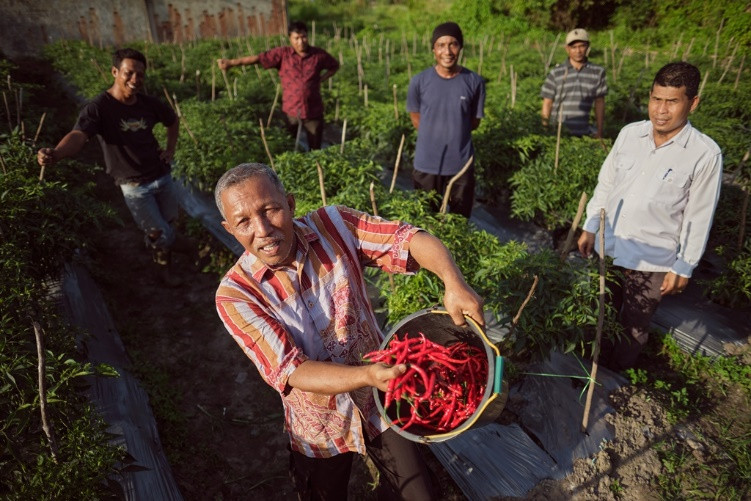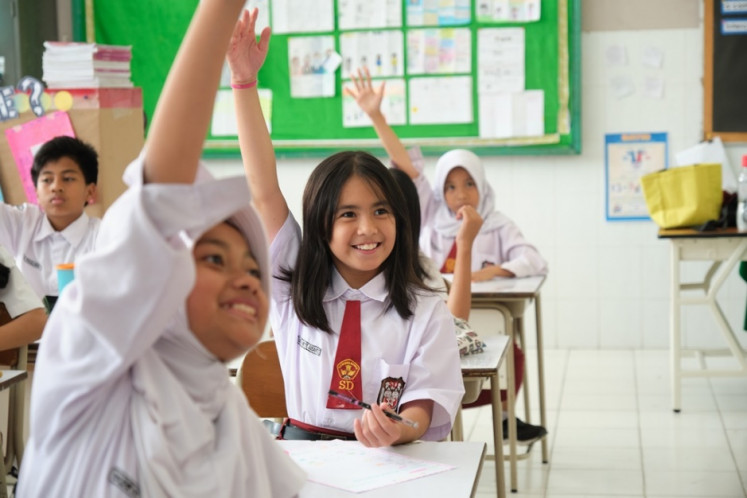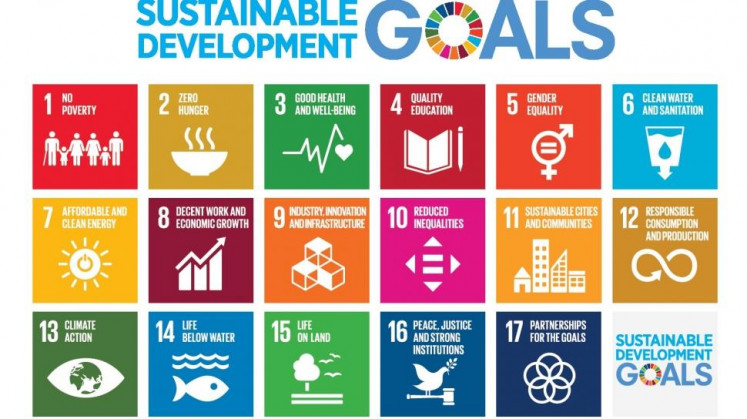Popular Reads
Top Results
Can't find what you're looking for?
View all search resultsPopular Reads
Top Results
Can't find what you're looking for?
View all search resultsAchieving SDGs in the New Normal: How to enter the decade of action
Change text size
Gift Premium Articles
to Anyone
T
his year should have been the beginning of a decade of concrete action to achieve targets set out in the United Nations Sustainable Development Goals (SDGs) by 2030.
However, these ambitious targets now face a significant setback due to the impact of the COVID-19 pandemic around the world.
The latest UN Sustainable Development Report 2020 indicates that the COVID-19 pandemic has the potential to cause severe negative impacts on most SDGs, specifically SDG 1 (ending poverty), SDG 2 (ending hunger), SDG 3 (achieving health and prosperity) and SDG 8 (full employment and economic growth).
Finance Minister Sri Mulyani said that COVID-19 could drive more Indonesians into poverty and unemployment as the pandemic batters the country’s economy
Under the “bad” scenario, 1.1 million new poor and 2.9 million new unemployed people will be added. The worst-case scenario projects 3.78 million people will fall into poverty and 5.2 million will lose their jobs.
These setbacks are doubly unfortunate, given that progress has been achieved since the SDGs were first adopted five years ago by 193 countries. Several signs of progress by the private sector were noted in a recent report released by the UN Global Compact, Uniting Business in The Decade of Action.
The private sector remains a key actor with the capability to push for the achievement of the SDGs. Based on the report, 84 percent of companies globally have taken concrete action to advance the Goals. However, of this number, only 46 percent have implemented the SDGs principles in their strategies, operations and overall supply chains.
Separately, a mini-survey by the Indonesia Business Council for Sustainable Development (IBCSD) found that 81.8 percent of companies in our country will continue to work to achieve the SDG targets, despite the COVID-19 pandemic.
Sihol Aritonang, Chairman of the IBCSD, said the new normal era had in fact provided a new momentum for achieving the SDGs, despite increased poverty and unemployment issues caused by the pandemic.
Sihol, who is also the president director of leading pulp and paper company PT Riau Andalan Pulp and Paper (PT RAPP), the operating arm of APRIL Group, said that intensive collaboration between the government, business players and the community, as well as other stakeholders, was essential to address the challenges posed by the pandemic.
Sihol provided an example of the partnership between PT RAPP and surrounding communities near the company’s operations in Riau. Through an intensive community development program, several micro, small and medium businesses in the vicinity receive practical advice to maintain their operations and generate income, despite difficult market conditions.
Improving human resources is a key challenge in Indonesia’s development agendaSDGs and human resources
Another challenge to address, in terms of achieving the SDGs in Indonesia, is the need to develop the country’s human resources, especially among development actors –individual or organizations that invest their resources and integrate all of their activities for better progress in achieving sustainable development goals.
The SDG Academy Indonesia - a collaborative initiative among the UN Development Program (UNDP), Tanoto Foundation, and the National Development Planning Ministry (PPN/Bappenas) - is a capacity-building program to build expertise between both government and non-government actors in implementing the SDGs at a local level.
At the academy, several face-to-face and online capacity-building programs with experts in the SDG field, both from within and outside the country, have been devised as part of a unique curriculum. The SDG Academy Indonesia programs will include development of SDG-oriented leadership, sustainable development management capabilities, monitoring and reporting, and policymaking.
The first batch of SDG Academy Indonesia participants is scheduled to start at the end of 2020. As well as classroom sessions and online classes, the SDGs Academy Indonesia will offer overseas study programs.
“Development is our responsibility. In accordance with the SDG principles of inclusiveness and 'no one left behind,' the Tanoto Foundation acts as a catalyst for partnerships, with the government, the private sector and other development partners collaborating to achieve the SDGs in Indonesia”.
“The introduction of the SDG Academy Indonesia, which is the first initiative of its kind in Indonesia, is part of the Tanoto Foundation's commitment to implementing an ambitious, transformative and universal program working toward poverty alleviation and sustainable development for all,” said Satrijo Tanudjojo, Global CEO of Tanoto Foundation.
Taking real action in the face of the new normal is not easy, said Satrijo. However, the principle of "no one left behind" can only be pursued if all parties – from government to the private sector and local communities -- continue to collaborate and innovate, regardless of the impact of COVID 19 pandemic, he said.
Impacted by COVID-19 pandemic: Based on the 2020 Sustainable Development Report, the COVID-19 pandemic, in the short term, is expected to have the potential to cause severe negative impacts on most SDGs, specifically SDG 1 (ending poverty), SDG 2 (ending hunger), SDG 3 (achieving health and wellbeing) and SDG 8 (decent work and economic growth)











